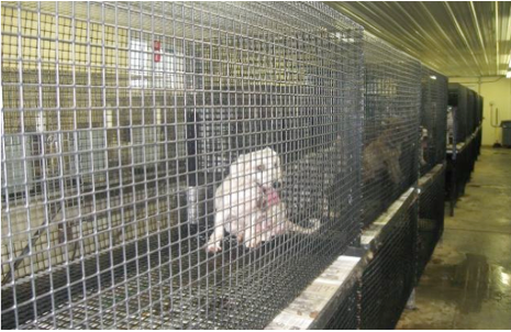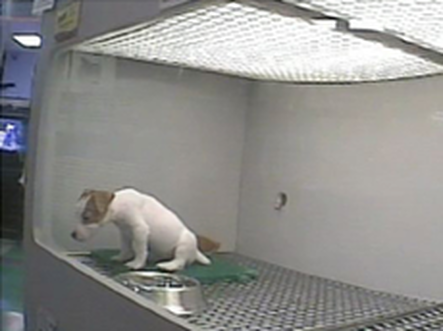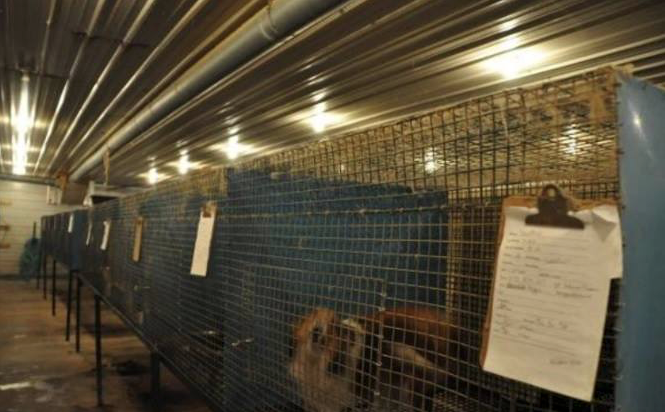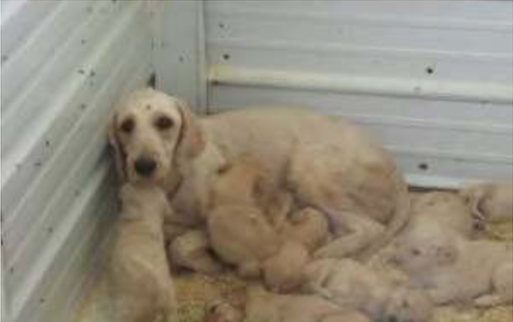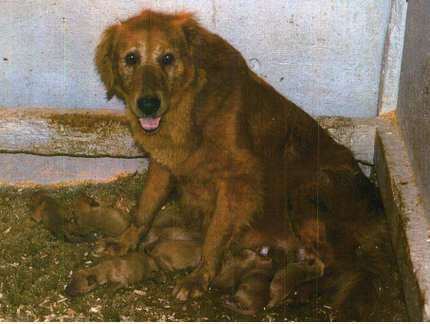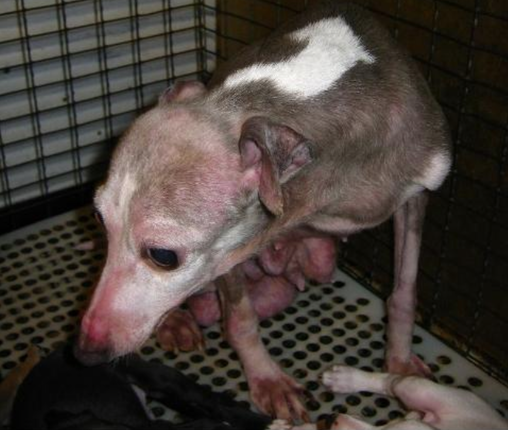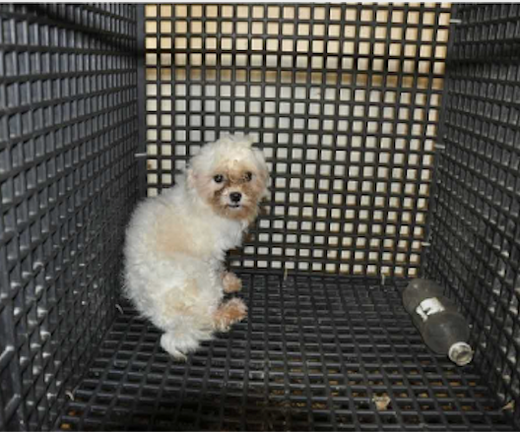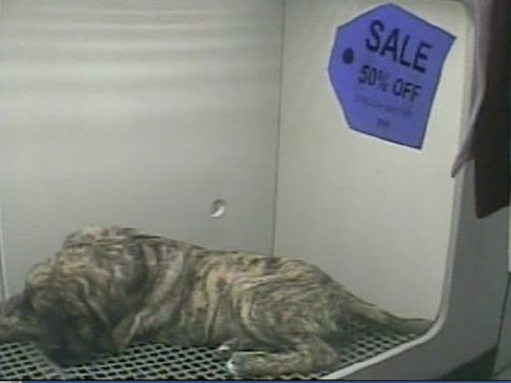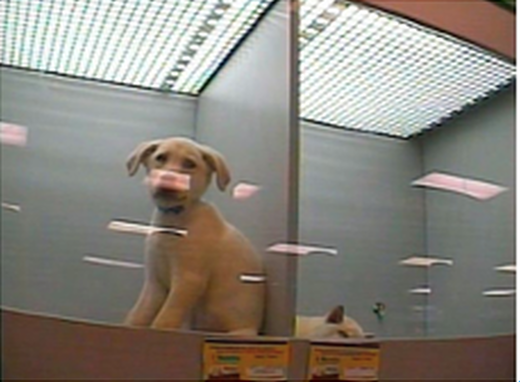ISSUE: THE PUPPY MILL TO PET STORE PIPELINE
Where do pet store puppies and kittens come from?
That's the question that should be asked and why the humane pet store ordinance is needed.
Often, consumers go to a pet store and see a "cute" puppy or kitten. They buy the pet — and yet they know nothing about where the puppy or kitten was born, the kennel conditions, or how the adult breeding animals (left behind in the kennels) are treated. These pet stores do not inform the consumer before the purchase.
That's the question that should be asked and why the humane pet store ordinance is needed.
Often, consumers go to a pet store and see a "cute" puppy or kitten. They buy the pet — and yet they know nothing about where the puppy or kitten was born, the kennel conditions, or how the adult breeding animals (left behind in the kennels) are treated. These pet stores do not inform the consumer before the purchase.
Pet stores who purchase and sell dogs and cats from industrial breeding facilities (known as puppy mills) do so deliberately. They place orders with the breeders, who then mass produce puppies or kittens of every breed to fill the orders.
These pet stores are the face of puppy mills. They are the distributor of these "products," putting sales and profits first and placing the welfare of puppies, kittens, and breeding animals at risk.
What needs to change?
A humane pet store ordinance to stop the sale of puppy mill puppies and kittens in pet stores is needed in the city of Blaine, Minnesota. By going humane, Blaine will help end puppy mill cruelty and prevent consumer heartache that can result from purchasing a sick or behaviorally challenged pet from a pet store.
If you live in Blaine, your voice is needed. Please contact your Blaine city councilmember to support a humane pet store ordinance and protect both animals and consumers.
What is a puppy mill?"A puppy mill is a dog breeding operation in which the health of the dogs is disregarded in order to maintain a low overhead and maximize profits." (Avenson v. Zegart, 577 F. Supp. 958, U.S. District Court, Minnesota.)
Pet stores place "orders" for puppies or kittens and the puppy mill mass produces the animals to fill the orders. To make higher sales, more animals are bred. To make higher profits, corners are cut, such as less staff, inadequate veterinary care, inadequate shelter and food, and multiple other factors. |
Adult breeding animals
Perhaps the most distressing concern with these type of pet stores and breeding facilities (puppy mills) are the adult male and female dogs and cats left behind in the kennels.
These adult breeding animals are confined in the kennel for years and bred repeatedly to produce as many litters as possible. When the female has a problem getting pregnant or starts delivering dead puppies or kittens, the animal is no longer considered of use to the breeder. The adult animal is then retired, killed, sold at auction, or given away to an animal shelter or rescue who pays for their care at their own expense.
Perhaps the most distressing concern with these type of pet stores and breeding facilities (puppy mills) are the adult male and female dogs and cats left behind in the kennels.
These adult breeding animals are confined in the kennel for years and bred repeatedly to produce as many litters as possible. When the female has a problem getting pregnant or starts delivering dead puppies or kittens, the animal is no longer considered of use to the breeder. The adult animal is then retired, killed, sold at auction, or given away to an animal shelter or rescue who pays for their care at their own expense.
The litters
Puppies and kittens are sold to pet stores, brokers or directly to consumers around 8 weeks of age. This is a critical development period for the animal and yet they are pulled from the mother and their littermates and often shipped across state lines where they may be re-caged at a broker's building then shipped again to pet stores, where they will be caged until sold. Studies have documented this sudden separation and stressful transport can lead to fear, anxiety, and other lasting behavioral problems that may be difficult or impossible to treat.
Physical health
Large-scale breeding facilities can cause stress and disease on the adult animals and puppies.
Poor to deplorable housing conditions and minimal veterinary care can contribute to a host of diseases and injuries, including heritable disorders. Example (per MSVMA Veterinary Report on Puppy Mills, May 2013):
Puppies and kittens are sold to pet stores, brokers or directly to consumers around 8 weeks of age. This is a critical development period for the animal and yet they are pulled from the mother and their littermates and often shipped across state lines where they may be re-caged at a broker's building then shipped again to pet stores, where they will be caged until sold. Studies have documented this sudden separation and stressful transport can lead to fear, anxiety, and other lasting behavioral problems that may be difficult or impossible to treat.
Physical health
Large-scale breeding facilities can cause stress and disease on the adult animals and puppies.
- Lack of sanitation and if animals are continually standing in feces or urine can spread bacteria and disease.
- Overcrowded conditions can increase stress and weaken immune systems.
- Contaminated water with algae or dirty food with mold can harbor microorganisms.
- Pests and mice droppings can spread diseases and viruses.
Poor to deplorable housing conditions and minimal veterinary care can contribute to a host of diseases and injuries, including heritable disorders. Example (per MSVMA Veterinary Report on Puppy Mills, May 2013):
- Cage/wire injuries to feet, legs, face, and body
- Bacterial Diseases: Kennel cough, brucellosis, staph sp. infections, pneumonia
- Parasitic Infections: giardia, hook worms, tape worms, round worms, whip worms, lung worms
- Viral Infection: parvo virus, distemper virus, parainfluenza type I and II
- Heritable Disorders: orthopedic problems (e.g., early hip dysplasia, luxating patella), heart abnormalities, neurological disorders, ocular abnormalities, chronic immune disease, allergies
Mental and behavioral health
In addition to physical health, the mental and emotional health of animals is critical to the animal's well-being and ability to function. Numerous studies have shown the necessity for performance standards, such as the ability to exercise, socialize with the same species and with humans, and being exposed to other factors that stimulate the mind. Breeding animals who are not provided these basic needs result in animals with psychological problems who may require years of rehabilitation.
What about the pet stores?
There are two types of pet stores in Minnesota:
Pet stores that choose to buy puppies and kittens from breeding facilities and then re-sale these animals are the "face" of puppy mills.
- Pet stores that do not buy and sell dogs and cats acquired from mass (industrial) breeding facilities and have instead chosen to sell pet supplies and services and/or use their stores to assist local animal rescue organizations and shelters with adoptions. These type of stores help unwanted and surrendered animals find permanent homes.
- Pet stores that place orders with and buy puppies and kittens from puppy mills or brokers and sell to unsuspecting consumers.
Pet stores that choose to buy puppies and kittens from breeding facilities and then re-sale these animals are the "face" of puppy mills.
How many pet stores are there in Minnesota?
There are a few remaining pet stores in Minnesota that still obtain dogs and cats from commercial breeding facilities and sell these animals to consumers. The vast majority of pet stores in Minnesota and nationwide have, on their own, switched to a humane pet store model and are operating successfully.
|
In the city of Blaine, there are eight pet stores — displayed in the chart at right. All of these pet stores sell pet supplies and some offer services such as grooming, daycare, training, and boarding.
Some of these pet stores also work directly with animal rescue organizations and offer "adoption" days for dogs and cats. Only one pet store in Blaine — Four Paws And A Tail — still buys from puppy mills and sells these puppies to consumers. |
To illustrate the size of some breeding facilities that sell puppies to pet stores, photos of these kennels, and some consumer complaints,
click link below. Three pet stores are profiled: Four Paws And A Tail (located in the city of Blaine), Petland (now closed; formerly in St. Paul), and Har Mar Pet Store (now closed; formerly in Roseville). NOTE: Four Paws and A Tail is under new ownership as of 2022.
Click here: Examples of Pet Stores and link to Industrial (Mass) Dog Breeding Facilities
|
Pricing
Pricing for an animal can vary widely. Breeders/brokers supply the animals and the pet store marks up the price for profit. To the left (top three rows) is a display of puppies from Four Paws and A Tail pet store (located in Northtown Mall, Blaine), as posted on their website in January 2021. Over 60 puppies were displayed (variety of breeds) with original prices ranging from $1,699.95 to $3,500. Sales prices were offered on four of the puppies. These prices are much higher than in past years. In October 2009, this same pet store displayed 50-75 puppies on their website. At that time, original prices ranged from $399.95 to $1,299.95 (average price about $599.95) with sale prices as low as $250. The store was sold to a new owner. |
|
To the left is a display of puppies from Four Paws and A Tail, under new ownership. These photos are from June 2022. At that time, 78 puppies were displayed. Prices ranged from $950 to $3,500.
Prices posted on May 27, 2023 ranged from $999 (only one puppy was priced at that) up to $4,499. The most common price was $2,599. Prices for certain puppies were reduced radically within a short period; one puppy, for instance, was priced at $4,499 on May 14 and dropped to $1,299 by May 27. This random pricing shows how these puppies, though sentient beings, are viewed as products to be deeply discounted — and yet still priced in the thousands. This is about sales and profits. The desire for money is what keeps these type of pet stores in business — it is a money-making venture and places animals at risk. |
Misleading statements
Breeder-supported pet stores may claim "they do not buy from puppy mills" and yet provide no proof of this claim to the consumer — no inspection reports, no animal counts, no photos of the breeding facilities, no data to allow the consumer to make an informed decision. Even if the name of a breeder or broker is given, it is difficult for the consumer to trace down this breeder and gain access to the facility to evaluate conditions and care of the animals. Further, no information provided stops the core problem: the mass production of puppies and kittens in industrial breeding facilities and the harm to these animals.
A pet store in Blaine claims on their website: "Our puppies are purchased from breeders who are USDA licensed; we choose breeders who we have researched, approved, and have continued to work with for many years. Our requirements are demanding, and we only purchase from the best." NOTE: USDA inspections do not ensure health or safety of the animals in the kennels.
Take action
The mass production of puppies and kittens is an antiquated business model,
which has been documented to hurt animals as well as consumers. To address this problem,
cities in Minnesota and across the nation have passed the Humane Pet Store Ordinance.
Help protect animals and consumers. Take action now.
which has been documented to hurt animals as well as consumers. To address this problem,
cities in Minnesota and across the nation have passed the Humane Pet Store Ordinance.
Help protect animals and consumers. Take action now.

